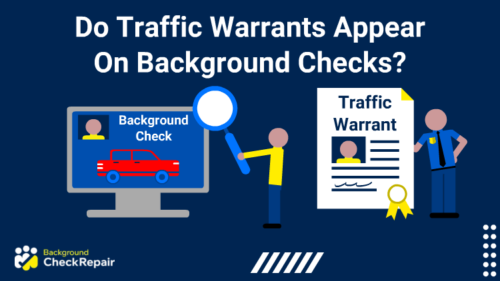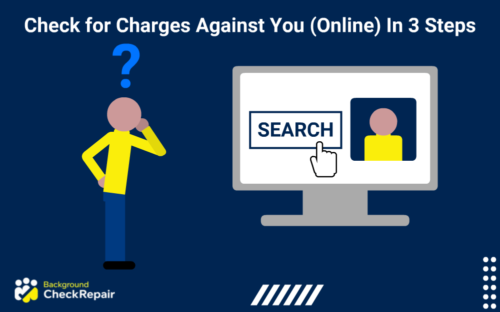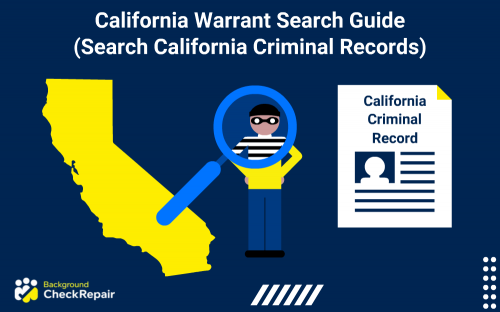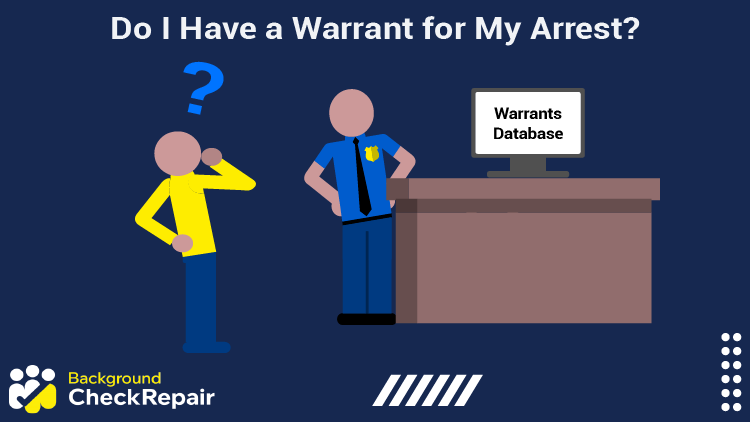
It probably doesn’t happen every day, but under certain circumstances, many people might wonder, do I have a warrant for my arrest?
Facing a warrant for arrest can be scary, depending on the severity of the crime.
Fortunately, there are many times when an arrest can be avoided, especially if you know how to confirm for sure that the warrant was issued, and know the laws in place for the jurisdiction.
This complete guide provides the method to search to see if you have a warrant in any state, and how the laws apply to that type of legal action.
Find Out: Do I Have a Warrant for My Arrest?
This question of do I have a warrant for my arrest will most likely arise if any of the following factors apply to you:
- Committing a crime
- Non-appearance when summoned before a court
- Existing warrant in a different state
- Non-adherence to a court order to pay child support
- Probation violation1
If you have any involvement in the above-mentioned activities, an arrest warrant can be issued. And, the place to look for them is often with the local sheriff’s office.
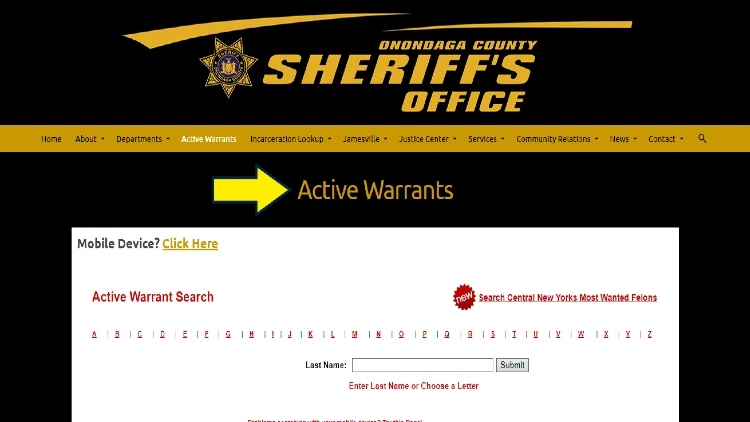
Most Sheriff’s Office websites has a warrant lookup feature, that allows users to search for active warrants in the county or municipality.
It must be noted, however, that most arrests take place without a warrant.
Arrest warrants are not required in some situations, such as when a suspect is actively fleeing from a scene of a crime.
However, to physically arrest someone from probable cause, a judge or magistrate must issue the warrant.
Do I Have a Warrant for My Arrest?
If you do find yourself asking, do I have a warrant for my arrest, and you haven’t received any formal notification that your arrest is pending, it is best to be prepared in the event that the police come knocking at your door.
Is There a Warrant Out for My Arrest?
If any of the following apply to you, there may be a warrant out for your arrest:
- There are existing charges against you, but the police have not managed to contact or locate you.
- You have been summoned to appear in court, but you failed to show up on the set date.
- You have been charged and requested to appear at a police station for formal identification, but failed to show up on the set date.
- You have breached the probation terms of another criminal charge.
- You have failed to show up to court after being subpoenaed to testify as a witness.
How To See if I Have a Warrant for My Arrest: All 50 States
The first question to answer is how to see if you have a warrant. While it is good to check databases and perhaps visit the police station, different states might provide different ways to search for the existence of an arrest warrant.
State-by-state information on searching for an outstanding warrant:
What Is an Arrest Warrant Used For?
Before getting into how long it would take a police officer to get an official arrest warrant, it is important to ask the question, exactly what is an arrest warrant?
According to law, an arrest warrant is a document that is typically only issued by a magistrate or a judge. This document gives the police force the authority to arrest a suspect and take them into custody.
While it is always preferred that an arrest warrant is presented, it is not a legal requirement when an arrest is made (lawful arrest).
Furthermore, an arrest warrant is also meant to protect citizens from any state against unlawful arrest and incarceration according to the Fourth Amendment.18
How To Find Out if You Have a Warrant
It is essential to know how to determine if there’s a warrant out for you if no police officer has contacted you regarding the same.
First, you need to determine which type of warrant has been issued, so you’ll know where to look.
Different Types of Warrants
- Search warrant: Issued for searching premises where a crime has taken place.16
- Arrest warrant: Issued for authorizing police to arrest a suspect.
- Bench warrant: Issued when an individual misses a court appearance (among other reasons).
- Extradition warrant: Issued for the arrest of a fugitive.
- Alias warrant: Issued when an individual fails to appear for a scheduled court date or fails to respond to a citation.
It should be noted that in the case of a search and seizure, it is possible to withdraw consent for a search at premises, even if the search is in progress, regardless of whether a search warrant was issued in the first place.
However, consent cannot be withdrawn once incriminating evidence has been found.2
How Does a Police Officer Get an Arrest Warrant?
So, how does a police officer obtain an arrest warrant?
Firstly, any police officer in need of an arrest warrant must complete and submit an affidavit to the authority that they wish to get the warrant from – either a magistrate or a judge.
There are a few states that allow for the warrant application to be completed over the telephone, but in any instance, the police officer must provide probable cause information that states there is enough evidence to incriminate the person that is named in the affidavit or application.
Typically, the information required for an arrest warrant includes:
- The name of the suspect.
- The type of crime committed.
- The name of the court that is providing the arrest warrant.3
How Long Does It Take To Get a Warrant?
How long does it take to get a warrant? This depends on whether an arrest warrant or search warrant is required.15
A search warrant is time-sensitive because objects relating to the relevant crime may still be at the scene of the crime and should be included in the ensuing investigation. This means that the warrant should be issued as a matter of urgency within a day or two.
When it comes to arrest warrants, there isn’t an urgent need to obtain these documents because probable cause dictates who the suspect is, and nothing will change this probable cause unless evidence suggests the suspect is innocent.
How to find out if you have a warrant of arrest is made easy by checking databases designed for this purpose (both paid and free).
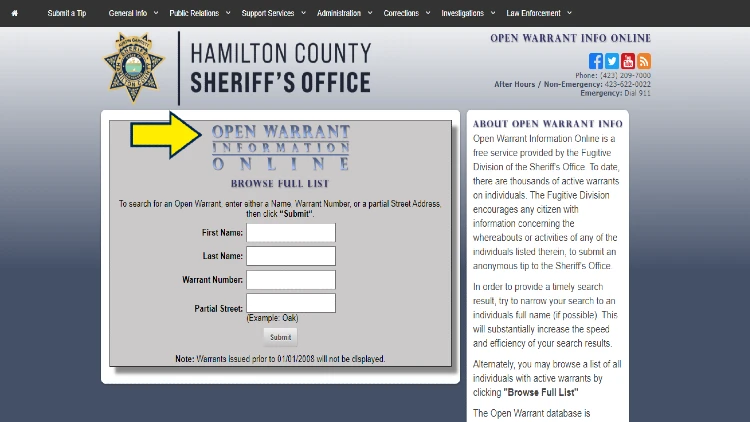
Some Sheriff’s Office warrant lookup platforms allow users to search by address, or simply browse the full active warrant list.
However, perhaps the most reliable way to determine whether a warrant is out for your arrest is to contact your local police station.
Do take note however, that if a bench warrant exists for your arrest and you enter a police station to check on your warrant status, you will most likely be arrested on the spot.4
How Do You Know if You Have a Bench Warrant?
A bench warrant will seek you out until you either clear it or die, whichever comes first.
That may sound harsh, but it is unfortunately also the truth.
Bench warrants are issued by judges when suspects or citizens fail to appear for a court hearing, when they disobey direct court orders or violate the rules of their probation, or even when they fail to pay outstanding fines.13
A bench warrant means that a police officer can arrest you at any given time and take you to jail.6
So, how do you know if you have a bench warrant?
The best way to know whether you have a bench warrant is to contact a criminal defense lawyer or to check the local court system. Court records can be viewed online, but if there is nothing to suggest that a local bench warrant has been issued, it is best to review statewide data just to be sure.7
For instance, if you are in Utah and would like to perform a warrant search within the state, you would use this online resource.14
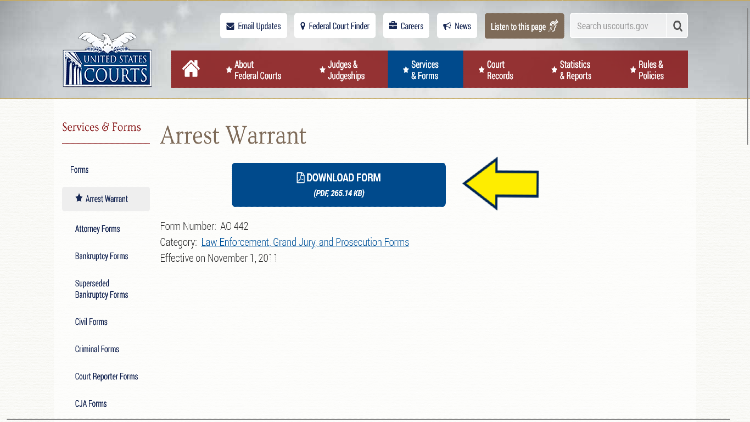
Federal warrants can be searched using grand jury information, however, it’s important to note that some warrants may be sealed from the public to prevent flight risks.
If you want to perform an online California warrant search and there is no relevant information on county websites, you should contact the local police station/s before performing a statewide warrant search.
In the case of a looking up a warrant, or arrest warrant, you can visit your local police station and have them search your details on their specialized database, but there is the likelihood that you will be arrested if it is found that a federal warrant has been issued.
A local district federal clerk will be able to check whether a federal warrant exists, and if it does, it is essential to employ the services of a criminal defense lawyer and then turn yourself in. Federal warrants are issued when a person is accused of committing a federal crime, and can only be fought with the help of a criminal defense attorney.8
Is an Arrest Warrant Search Necessary For Me To Do?
At this point you may be asking, is an arrest warrant search necessary? Or will it simply cause trouble?
It is indeed necessary if you have any reason to believe that an arrest warrant may have been issued for your arrest. It is especially necessary if there is reason to believe that a bench warrant or federal warrant has been issued, considering you may be arrested at any time.
Do Warrants Show Up on Background Checks?
If you’re already wondering, do I have a warrant for my arrest, you may also be wondering what other aspects of your life may be impacted by having an existing warrant of arrest. For instance, can background investigations reveal said warrants?
While many warrants can be found online as part of official records, warrants are not likely to appear when conducting a standard criminal record search.17 However, if for some reason a potential employer requests a level 2 or FBI background search, it becomes likely that an arrest warrant will show up.9
Can You Pass a Background Check With a Warrant?
So, if a warrant is on you record, is it still possible to pass a background screening? The short answer is, you can pass a background check with a warrant if the warrant was issued by a court.
Warrants cannot be issued by administrative departments such as the DMV, and the warrant itself must be a legitimate search or arrest warrant.
It is essential to be honest upfront if a warrant is likely to show up during a background check.10
Will a Probation Warrant Show Up on Background Check?
Probation warrants, even old ones are likely to show up during background checks. Often, thorough background searches and checks are done for the express purpose of determining whether a candidate is on probation, especially if the probation is a result of dishonest behavior.
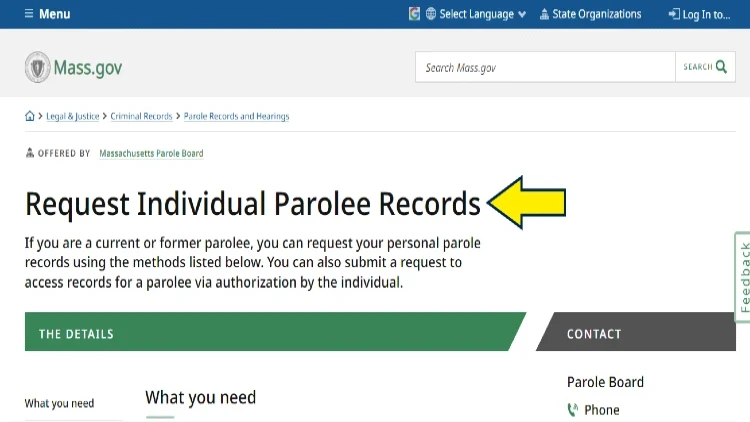
A probation violation warrant can appear on some background check reports.
Unfortunately, being on probation will likely affect your eligibility for various jobs.
Do Traffic Warrants Appear on Background Checks?
It is possible for open traffic warrants to pop up during pre-employment background checks. The reason for traffic warrants being issued is usually because traffic laws have been violated and the ensuing fines have not been paid.
Once the traffic fine has been paid and the warrant cleared, it will no longer appear during a background search.11
What Should You Do if You Find Out There Is a Warrant for Your Arrest?
It is important to know, what should you do if you find out there is a warrant for your arrest.19
The below steps should be followed for the best possible outcome:
- Hire a criminal defense lawyer. These types of attorneys are skilled at providing advice before court hearings and helping to get charges reduced or dismissed.
- Get in touch with a bail bonds person. This is an essential step if bail posting is an option.
- Don’t hesitate in turning yourself in. No matter what the situation, it is always best to take the first step and turn yourself in after discovering a warrant of arrest (After speaking with an attorney). Working with authorities will assist in a quicker release.
- Do not be compelled to make statements when the criminal defense lawyer is not present. The lawyer should be present at all times whenever the police are questioning you.12
The answer to the question, do I have a warrant for my arrest, may cause some distress and anxiety, but following the above steps will greatly assist in making a difficult process that much easier.
Frequently Asked Questions About Do I Have a Warrant for My Arrest







